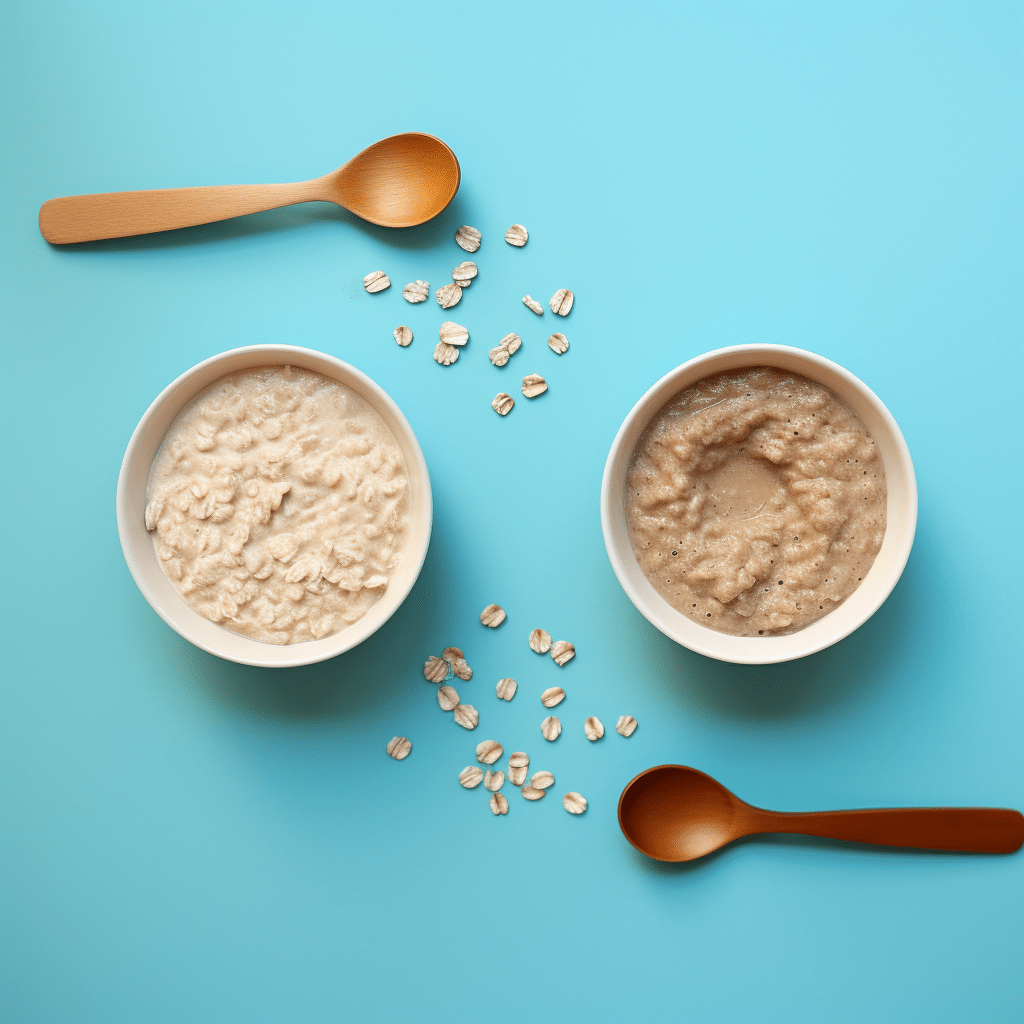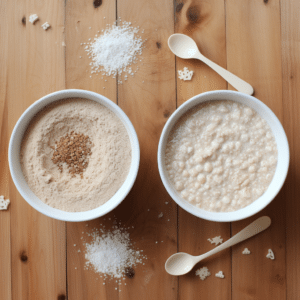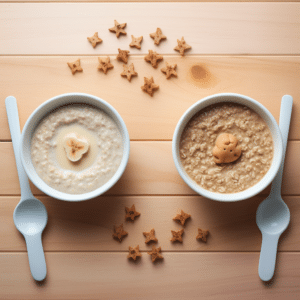
Baby Oatmeal vs Regular Oatmeal: Choosing Right
Whole grain oats have many nutrients such as starch, proteins, dietary fiber, and unsaturated fats. It Oatmeal also contains a considerable amount of antioxidants, minerals, and vitamins.
The Oatmeal is the best cereal you can buy for your baby, especially when aged six months. Oatmeal can form viscous solutions because of the beta-glucan fiber constituents. The viscous solution then coats and feeds the beneficial bacteria in the baby’s gut. The overall outcome is dramatic improvement and protection of the baby’s undeveloped digestive system.
Generally, oatmeal can either be regular oatmeal or baby oatmeal. What is the difference between the two oatmeal variants? Do they share any similarities? How do you administer each type? Is oatmeal good for your child? Should you give them every day? Continue reading to find answers to all these questions.

Baby Oatmeal vs Regular Oatmeal: Differences
The only difference between the baby oatmeal and regular oatmeal is that regular oatmeal is not recommended for babies. Regular oatmeal has a rough, thick, and coarse texture that is not friendly to the baby’s intestines.
In addition, the rough coarse, and thick texture of the regular oatmeal makes it difficult for the baby to chew and swallow. The un-chewed regular oatmeal has detrimental effects on the gut. For example, it can make the baby’s undeveloped digestive system struggle with food breakdown, and that can cause abdominal discomfort.
Baby oatmeal is good for infants and babies. Unlike regular oatmeal, baby oatmeal undergoes more processing, making them have fine and small particles that don’t require excessive mastication.
The oats used to make baby oatmeal are dried, flaked, and steamed, making them have a smoother and thinner appearance. Due to the thin texture of baby oatmeal, the variant is safer for younger babies.
Baby Oatmeal vs. Regular Oatmeal: Similarities
Baby and regular oatmeal have similar nutrition profiles. The only difference is based on the oat’s overall texture.
Various scientific evidence shows that baby or regular oatmeal consumption boosts the growth of normal bacteria in the gut within a week.
The two oats variants are also beneficial when it comes to decreasing constipation. They act as natural laxatives, which optimize digestive health and bowel function.
Regular and baby oatmeal contains antioxidants and other essential minerals that are much concentrated in the outer layer of the oat grain. Therefore, the less processed the oats, the more nutritious they become.
Baby Oatmeal vs. Regular Oatmeal: Frequently Asked Questions
Is Oatmeal Good For Your Child?
Oatmeal is safe for your bay. The baby oatmeal variant is specifically designed to promote growing infants’ appetite and digestive health.
Use baby oatmeal if your child is aged less than 6 months. As they grow older than 6 months, slowly introduce regular oatmeal. Starting with baby oatmeal is important because they are soft and easy to digest; therefore, they don’t overwork the digestive system.
On the other hand, the regular oatmeal is rough and coarse, containing a slightly high amount of natural fibers. The level of minerals, vitamins, and antioxidants are relatively the same for the two oatmeal variants.
If you want to boost your child’s neurological development and bone functions. Please use the baby oatmeal for the first 6 months of life. After that, start introducing the regular oatmeal in smaller bits.
What Is The Difference Between Baby Oatmeal And Regular Oatmeal?
Baby oatmeal is equivalent to instant oatmeal, which is pre-cooked and crushed into a fine grain reheated with hot liquid.
The only variation between regular and baby oatmeal is the texture and not the nutritional profile. Regular oatmeal has a rough and coarse texture, while baby oatmeal has a fine feeling.
Can Babies Eat Regular Oatmeal?
You can give your baby regular oatmeal when they are past 6 months. Before they turn 6 months, it’s recommended that you offer exclusive breastfeeding for your child.
However, you can still supplement their diet with baby oatmeal when things are not working out well or when you want your baby to have the proper bones and neuron development. Remember, they should be able to tolerate the solid food.
Is Baby Oatmeal Necessary For Your Child?
Oatmeal has an extensive nutritional profile to aid in baby growth and development. It’s recommended that you start feeding your baby with solid food once they turn 6 months.
Oats are whole-grain cereals that are easy for the baby’s digestive system to break down. Oat promotes abdominal fullness, prevents gas, and boosts a healthy appetite.
Can A 4 Month Old Baby Eat Oatmeal?
Children can start using the baby oatmeal as early as they attain 4 months. According to the American Academy of Pediatrics, you should start feeding your child solid food when they are at 6 months.
The indicator that your child is ready to use the solid food is the tongue-thrust reflex that enables them to swallow once the food is introduced into the oral cavity.
In addition, if the child is showing interest in the food that someone else is eating or they can pick things and insert them into the mouth, it’s a good sign for you to try giving them solid food.
Can you Give Baby Oatmeal Every Day?
3 to 4 tablespoons of baby oatmeal every day is enough to offer them additional nutrients and fibers

Wrap Up
To summarize it all for you, you need to know that baby oatmeal is suitable for babies because they have a fine texture. Regular oatmeal is used in children aged above 6 months because of its coarse texture that is difficult for children under 6 months to break.
The nutritional profile of regular and baby oatmeal is the same. Therefore, don’t worry about losing essential nutrients, vitamins, minerals, or antioxidants when you settle on a single choice.
Don’t serve your regular baby oatmeal if your child can’t chew and swallow food properly. You can use the baby oatmeal when the swallow reflex is in its early stages and need to take solid food is irresistible. Baby oatmeal is more processed. Therefore, the baby’s digestive system of a child less than 6 months can easily tolerate it.